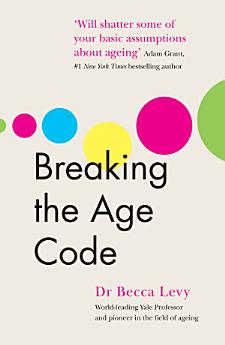Breaking the Age Code
એપ્રિલ 2022 · Random House
ઇ-પુસ્તક
304
પેજ
family_home
પાત્ર
info
reportરેટિંગ અને રિવ્યૂ ચકાસેલા નથી વધુ જાણો
આ ઇ-પુસ્તક વિશે
'Will shatter some of your basic assumptions about ageing' - Adam Grant
Why do some people age better and live longer than others?
This is the question that led leading expert and researcher Dr Becca Levy to discover a fascinating truth: just changing the way you think about ageing can add years to your life.
In Breaking the Age Code, Dr Levy draws on pioneering research to offer stunning revelations about the mind-body connection. She demonstrates that many aspects of ageing we consider to be natural, such as memory loss, hearing decline and cardiovascular events, are in fact influenced by our own negative biases, often informed by cultural ageism. She tackles head on how we can shift these outdated ideas at a societal level and what we can do to help ourselves.
Positive, practical and full of fresh insights, Breaking the Age Code will dismantle your assumptions about how we get older and leave you looking forward to what the future holds.
'Breaking the Age Code is less a self-help manual than a manifesto for a revolution' - Anna Maxted, The Times
Why do some people age better and live longer than others?
This is the question that led leading expert and researcher Dr Becca Levy to discover a fascinating truth: just changing the way you think about ageing can add years to your life.
In Breaking the Age Code, Dr Levy draws on pioneering research to offer stunning revelations about the mind-body connection. She demonstrates that many aspects of ageing we consider to be natural, such as memory loss, hearing decline and cardiovascular events, are in fact influenced by our own negative biases, often informed by cultural ageism. She tackles head on how we can shift these outdated ideas at a societal level and what we can do to help ourselves.
Positive, practical and full of fresh insights, Breaking the Age Code will dismantle your assumptions about how we get older and leave you looking forward to what the future holds.
'Breaking the Age Code is less a self-help manual than a manifesto for a revolution' - Anna Maxted, The Times
લેખક વિશે
DR BECCA LEVY is the Professor of Epidemiology and the Chair of the Yale School of Public Health, Social & Behavioral Sciences Department. She is also a Professor of Psychology in the Yale University Department of Psychology. She is the leader and pioneer of a field of study that focuses on how both positive and negative age stereotypes affect the health of older individuals and has led WHO efforts to investigate the impact of ageism on the health of older people. She has published many articles, won numerous awards for her work and been cited widely across the media. She speaks extensively about her work around the world, including in the UK, Singapore, Korea, Germany, Switzerland and of course the US.
આ ઇ-પુસ્તકને રેટિંગ આપો
તમે શું વિચારો છો અમને જણાવો.
માહિતી વાંચવી
સ્માર્ટફોન અને ટૅબ્લેટ
Android અને iPad/iPhone માટે Google Play Books ઍપ ઇન્સ્ટૉલ કરો. તે તમારા એકાઉન્ટ સાથે ઑટોમૅટિક રીતે સિંક થાય છે અને તમને જ્યાં પણ હો ત્યાં તમને ઑનલાઇન અથવા ઑફલાઇન વાંચવાની મંજૂરી આપે છે.
લૅપટૉપ અને કમ્પ્યુટર
Google Play પર ખરીદેલ ઑડિઓબુકને તમે તમારા કમ્પ્યુટરના વેબ બ્રાઉઝરનો ઉપયોગ કરીને સાંભળી શકો છો.
eReaders અને અન્ય ડિવાઇસ
Kobo ઇ-રીડર જેવા ઇ-ઇંક ડિવાઇસ પર વાંચવા માટે, તમારે ફાઇલને ડાઉનલોડ કરીને તમારા ડિવાઇસ પર ટ્રાન્સફર કરવાની જરૂર પડશે. સપોર્ટેડ ઇ-રીડર પર ફાઇલો ટ્રાન્સ્ફર કરવા માટે સહાયતા કેન્દ્રની વિગતવાર સૂચનાઓ અનુસરો.




